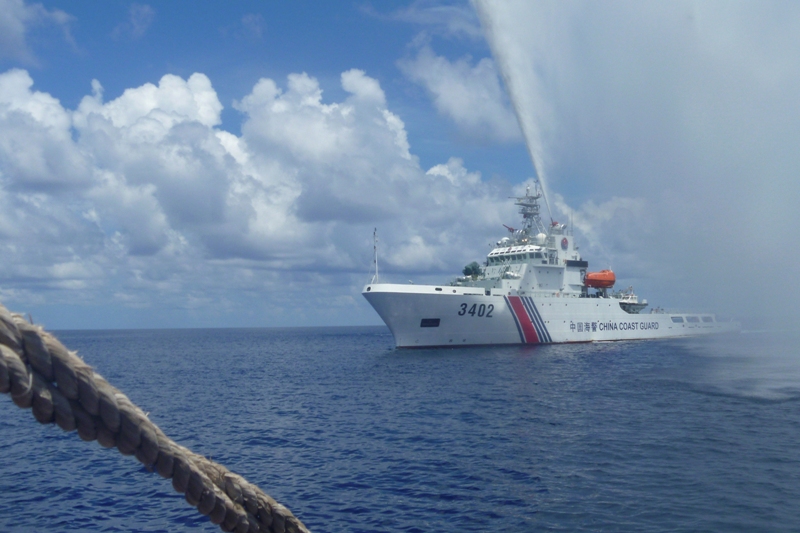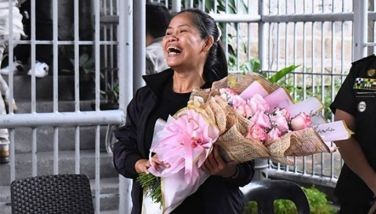Think tank calls views on Duterte's pivot to China 'too simplistic'
December 11, 2016 | 4:45pm

In this Sept. 23, 2015, file photo, Chinese Coast Guard members approach Filipino fishermen as they confront each other off Scarborough Shoal in the South China Sea, also called the West Philippine Sea. Philippine President Rodrigo Duterte, who has considerably reduced tensions with China over contested South China Sea waters, says he plans to declare a marine sanctuary at the disputed Scarborough Shoal. Such a move would keep away both Filipino and Chinese fishermen and prevent China from constructing any facilities, like it did on seven other features farther south in the Spratly archipelago.
AP / Renato Etac, File
MANILA, Philippines — Observations that the Philippines is cozying up to China and veering away from allies like the United States (US) and Japan under President Rodrigo Duterte are too simplistic, a think tank director said.
Shingo Yamagami, acting director general of the foreign affairs think tank Japan Institute of International Affairs (JIIA), said that such observations from the foreign press are "too simplistic and off the mark."
Yamagami pointed out that the Philippine president made a visit to Vietnam before his trip to China and then afterward headed for Japan. The two countries have competing claims with China on a group of islands.
Japan and China lay claim to a group of islands which is called Senkaku by Tokyo and Diaoyu by Beijing. Meanwhile, Vietnam and China have disputes over Paracel Islands called as Xisha by Beijing and Hoàng Sa by Hanoi.
"Before President Duterte went to Beijing, he went to Hanoi. After his trip to Beijing, he came to Tokyo. You may have seen the text of the Philippine-Japan joint statement issued by Prime Minister [Shinzo] Abe and President Duterte. It is perfect. Perfect from Japanese viewpoint as well," Yamagami said Thursday at the Pilipinas Conference by Stratbase ADR Institute.
The Philippines-Japan joint statement issued in October tackled the South China Sea and the arbitral tribunal ruling. It stated the commitment of the two countries in upholding freedom of navigation and overflight in the sea lanes of the South China Sea.
FULL TEXT: Joint statement of the Philippines and Japan
They also agreed to pursue a rules-based approach to the peaceful settlement of maritime disputes. Similar commitments were made in the Philippines-China joint statement during Duterte's state visit to Beijing.
FULL TEXT: Joint statement of the Philippines and China
Relations between the Philippines and its longtime ally, the US, soured after criticisms from Washington against Duterte's war on drugs, a government campaign riddled with mounting deaths and human rights violations. In a speech in China, the Philippine president said he is cutting military and economic ties with the US. A month later, Duterte said he would align Philippine foreign policy toward China-led Asian economic development.
Yamagami, however, said it is a natural move for the Philippines to maintain close trade and investment relationships with China, an emerging power in East Asia.
What is important, according to him, is to speak up on issues of political and security significance as parties keep close trade and investment pacts with China.
Tokyo has earlier warned of weakening ties with Beijing as Chinese vessels sailed near disputed islands last August.
BrandSpace Articles
<
>
Philstar
- Latest
- Trending
Trending
Latest



























